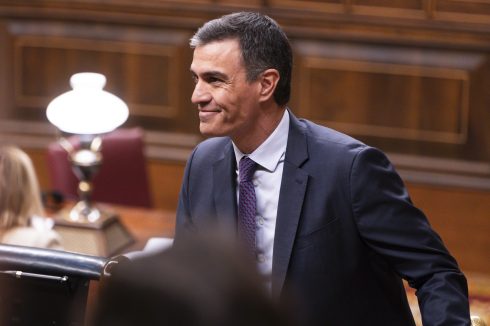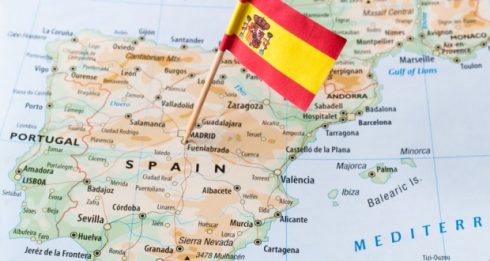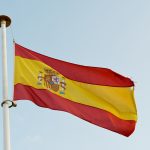HE saved the best discovery till last.
For explorer Christopher Columbus was actually a Catalan Jew, a study has revealed.
During a time when Spanish Jews were being hunted down and executed across the peninsula, Columbus managed to keep his true identity a secret.
After analysing his letters, a professor at the University of Georgetown in Washington found that he wrote in dialect Catalan Ladino – used by Catalans with Jewish heritage at the time. The findings have been published in a study titled “The DNA of the writings of Columbus”.
Professor Estelle Irizarry – who made the discovery – explained that, although he wrote in Castilian, it was clearly not his first language.









Was Columbus as Jewish as chicken soup? Or as Catholic as Spanish Ham? I believe they jury is still out, gang.
Catatan? Catalan?
Catalonia is an ancient nation in Europe without state, like Scotland, Walles… Today is a province of Spain but before was a big nation. In the next years, Catalonis can be a new state in Europe if the independentisme follow his growing. 12 millions of people speaks in catalan language and his economy is powerfull. In the middle age, Catalonia was an empire. Look the history books.
More info about Catalonia:
http://catalonianewstate.com
He must be the first and only Catatan :)
castellano was not his first language because he was born and raised in genova, italy – or was that somehow disproved?
Castellano is the language of Castilla (Spain), not Genova, (Italy). The new studies defend the catalan origin of Columbus. His first laguage was catalan. The question is: Why Castilla manipulated the history during 500 years? Why Castilla hided the catalan origins of Columbus? In these times, Castilla was federated with Catalonia. Two kingdoms, one new continent… The mistery beggins.
I know what castellano is and what catalan is. Columbus has always been said to be born in Genova, Italy, in which case the secondness of his spanish would come from a genoan italian being his first language. Looking around I find that there is a lot of new but unclear information that might mean he wasn’t born in Genoa but not in Cataluña either, no conclusions possible yet.
Samuel Eliot Morison, who had absolutely no reason to be anything but completely objective, wrote the following in Chapter II of his book “Admiral of the Ocean Sea,” pp.7-8.
“There is no mystery about the birth, family or race of Christopher Columbus. … There is no more reason to doubt that Christopher Columbus was a Genoese-born Catholic Christian, steadfast in his faith and proud of his native city, than to doubt that George Washington was a Virginia-born Anglican of English race, proud of being an American.
“Every contemporary Spaniard or Portuguese who wrote about Columbus and his discoveries calls him Genoese. Three contemporary Genoese chroniclers claim him as a compatriot. Every early map on which his nationality is recorded describes him as Genoese. Nobody in the Admiral’s lifetime, or for three centuries after, had any doubt about his birthplace.
“If, however, you suppose that these facts would settle the matter, you fortunately know little of the so-called ‘literature’ on the ‘Columbus Question.’ By presenting farfetched hypotheses and sly innuendos as facts, by attacking documents of proven authenticity as false, by fabricating others (such as the famous Pontevedra documents), and drawing unwarranted deductions from things that Columbus said or did, he has been presented as Castilian, Catalan, Corsican, Majorcan, Portuguese, French, German, English, Greek, and Armenian.”
Morison noted that many existing legal documents demonstrate the Genoese origin of Columbus, his father Domenico, and his brothers Bartolomeo and Giacomo (Diego). These documents, written in Latin by notaries, were legally valid in Genoese courts. When notaries died, their documents were turned over to the archives of the Republic of Genoa. The documents, uncovered in the 19th century when Italian historians examined the Genoese archives, form part of the “Raccolta Colombiana”. On page 14, Morison wrote:
“Besides these documents from which we may glean facts about Christopher’s early life, there are others which identify the Discoverer as the son of Domenico the wool weaver, beyond the possibility of doubt. For instance, Domenico had a brother Antonio, like him a respectable member of the lower middle class in Genoa. Antonio had three sons: Matteo, Amigeto and Giovanni, who was generally known as Giannetto (the Genoese equivalent of ‘Johnny’). Giannetto, like Christopher, gave up a humdrum occupation to follow the sea. In 1496 the three brothers met in a notary’s office at Genoa and agreed that Johnny should go to Spain and seek out his first cousin ‘Don Cristoforo de Colombo, Admiral of the King of Spain,’ each contributing one third of the traveling expenses. This quest for a job was highly successful. The Admiral gave Johnny command of a caravel on the Third Voyage to America, and entrusted him with confidential matters as well.”
thank you, dom. i have memories of this sort of claim about his birth from decades ago. and then there’s his death, one can visit at least two different burial places, one in spain and one in dominicana
The medieval scholar Diana Gilliland Wright “casts doubt on Irizarry’s belief.”
http://medievalnews.blogspot.com/2009/10/scholar-casts-doubt-on-claims-that.html
In “Christopher Columbus,” Univ. of Okla. Press (1987), pp. 10-11, Gianni Granzotto lists the following information from documents written by contemporaries of Columbus:
1. Pietro Martire d’Angera (Peter Martyr) was the earliest of Columbus’s chroniclers and was in Barcelona when Columbus returned from his first voyage. In his letter of May 14, 1493, addressed to Giovanni Borromeo, he referred to Columbus as Ligurian [“vir Ligur”], Liguria being the Region where Genoa is located.
2. A reference, dated 1492 by a court scribe Galindez, referred to Columbus as “Cristóbal Colón, genovés.”
3. In “History of the Catholic Kings,” Andrés Bernaldez wrote: “Columbus was a man who came from the land of Genoa.”
4. In “General and Natural History of the Indies,” Bartolomé de Las Casas asserted his “Genoese nationality.”
5. In a book of the same title, Gonzalo de Fernández de Oviedo wrote that Columbus was “originating from the province of Liguria.”
6. Antonio Gallo, Agostino Giustiniani and Bartolomeo Serraga wrote that Columbus was Genoese.
In 1498 Pedro de Ayala, the Spanish envoy in London, called John Cabot “another Genoese like Colón.” http://www.bris.ac.uk/Depts/History/Maritime/Sources/1498ayala.htm
The “ample evidence” supporting the Genoese origin of Columbus is also discussed by Miles H. Davidson, a Columbus scholar from the Dominican Republic, in “Columbus Then and Now: A Life Reexamined,” University of Oklahoma Press (1997) pp. 3-15. Davidson dismisses all other theories as “futile speculation … mostly attributed to parochialism.” [p. 7] Davidson also debunks the fanciful claims about the high social rank of Columbus’s wife.
Michele da Cuneo, Columbus’s childhood friend from Savona, sailed with Columbus during the second voyage and wrote: “In my opinion, since Genoa was Genoa, there was never born a man so well equipped and expert in the art of navigation as the said lord Admiral.” [Felipe Fernández-Armesto, “Columbus,” Oxford Univ. Press, (1991) pp. 103-104]
Columbus named the small island of “Saona … to honor Michele da Cuneo, his friend from Savona.” [Paolo Emilio Taviani, “Columbus the Great Adventure,” Orion Books, New York (1991) p. 185]
Before leaving for his fourth voyage, Columbus wrote a letter to the Governors of the Bank of St. George, Genoa, dated at Seville, April 2nd, 1502.
http://books.google.com/books?id=TKgKAAAAIAAJ&pg=PA128
in which he wrote “Although my body is here my heart is always near you.”
The biography written by Columbus’s son Fernando, “Historie del S. D. Fernando Colombo; nelle quali s’ha particolare, & vera relatione della vita, & de fatti dell’Ammiraglio D. Cristoforo Colombo, suo padre: Et dello scoprimento ch’egli fece dell’Indie Occidentali, dette Mondo Nuovo” [English translation: “The life of the Admiral Christopher Columbus by his son Ferdinand,” translated by Benjamin Keen, Greenwood Press (1978)] is available, in Italian, at:
http://www.liberliber.it/biblioteca/c/colombo_fernando/
At the top of page 4 of Keen’s translation, Fernando listed Nervi, Cugureo, Bugiasco, Savona, Genoa and Piacenza as possible places of origin. He also stated: “Colombo … was really the name of his ancestors. But he changed it in order to make it conform to the language of the country in which he came to reside and raise a new estate.” (Colom in Portugal and Colón in Castile).
The publication of “Historie” provides irrefutable, indirect evidence about the Genoese origin of the Discoverer. Fernando’s manuscript was eventually inherited by his nephew Luis, the playboy grandson of the Discoverer. Luis was always strapped for money and sold the manuscript to Baliano de Fornari, “a wealthy and public-spirited Genoese physician”. On page xv, Keen wrote: “In the depth of winter the aged Fornari set out for Venice, the publishing center of Italy, to supervise the translation and publication of the book.”
On page xxiv, the April 25, 1571 dedication by Giuseppe Moleto states: “Your Lordship [Fornari], then, being an honorable and generous gentleman, desiring to make immortal the memory of this great man, heedless of your Lordship’s seventy years, of the season of the year, and of the length of the journey, came from Genoa to Venice with the aim of publishing the aforementioned book … that the exploits of this eminent man, the true glory of Italy and especially of your Lordship’s native city, might be made known.”